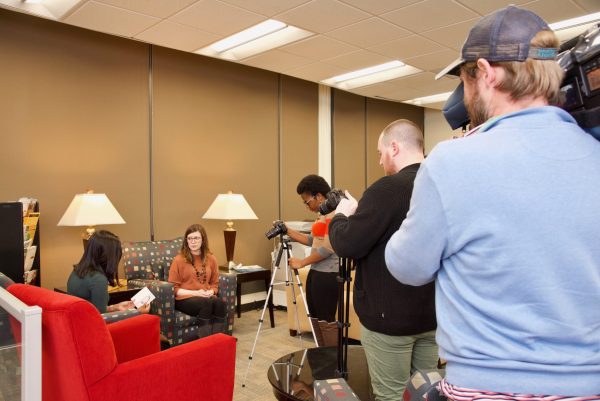Student Film Helps Couples Dealing With Infertility

For couples seeking to overcome infertility, the process can prove emotionally and financially daunting. At the same time, those who care about them can struggle to know how to show support.
A new documentary created by graduate students in a visual ethnography class in UNC Charlotte’s Department of Communication Studies offers insights to the couples and their loved ones.
“Our purpose is to try and better understand their journey and hopefully help people as a result,” says graduate student Cameron Davis, who was an interview and editing lead on the project. Led by faculty members Margaret Quinlan and Bethany Johnson, whose expertise includes health communications, the project considers the social support systems of individuals undergoing or experiencing infertility treatment.
Their work has been featured by WSOC-TV, with interviews of Davis, Johnson and Quinlan. The work will be a part of a traveling exhibit called “The Art of Infertility.” The work also resulted in a series of greeting cards designed for patients undergoing infertility treatment, and students also hope to enter the documentary in film competitions.
For the project, students interviewed almost two dozen people across the nation to consider varied points of view. They also interviewed some of the project team members, to gain reflections on the process of creating the film.
On one day of filming on the UNC Charlotte campus, graduate student Nathan Pope angled two video cameras toward Johnson, who was brightly lit by brilliant white studio lights. Shanice Cameron took her place behind one of the cameras, checking the sound levels in the few moments before the interview with Johnson. Meanwhile, in an adjacent studio, Davis waited to begin an interview of a medical professional.
Questions were prepared, camera batteries were fully charged, and the surrounding areas of the technology-filled rooms grew silent. The students’ task on this day was to interview people who are dealing with this issue and professionals who provide care for patients with infertility.
“This is an important topic because it speaks to some of the hegemonic structures in our society that set up the rigid ideas of femininity and masculinity,” Cameron said. “This topic also challenges the ideas of what makes someone a woman or a mother.”
Social scientists need to remember the impact research can have when studying the marginalization of women, fellow student Pope said. “Infertility treatment is a very vulnerable experience for individuals, thus social support is crucial to their journey,” he said.